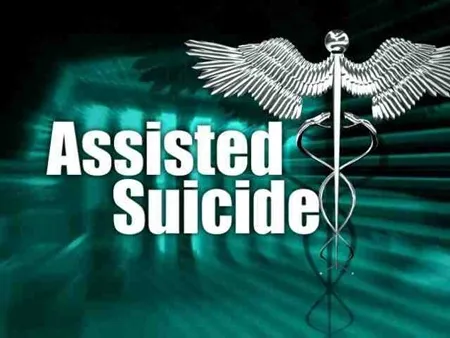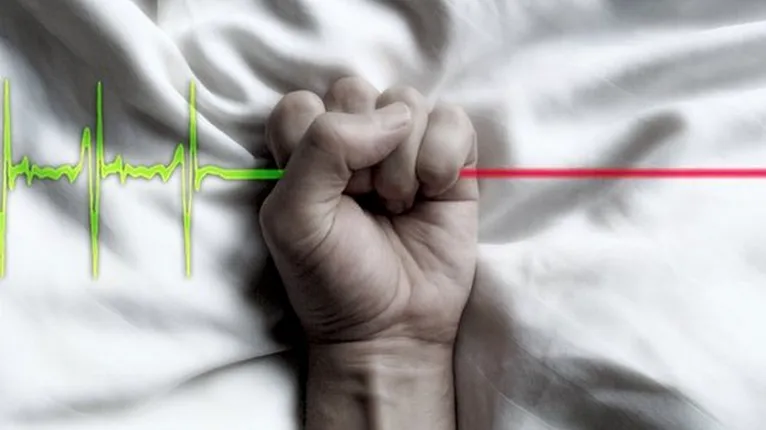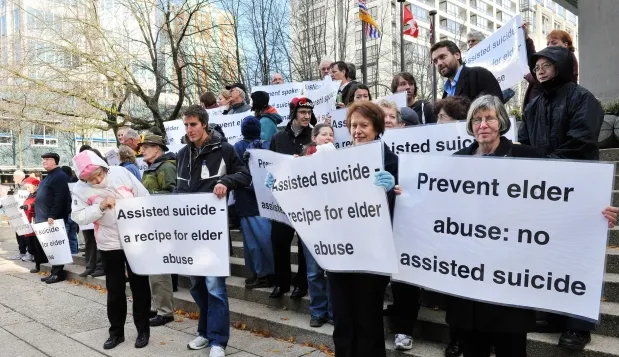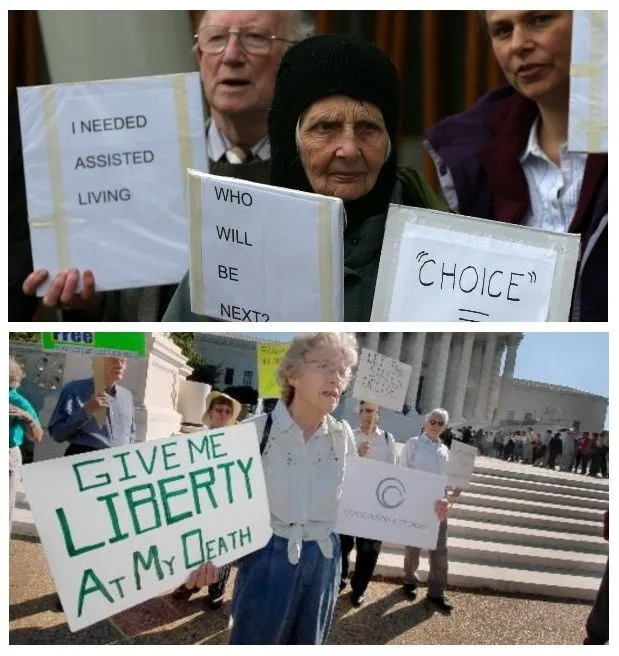
Source
I have to admit that writing this article proved to be much harder than I had originally anticipated. Firstly because being a doctor myself means that one day this topic may go beyond the scope of a philosophical dilemma or a debate and actually become a reality and a decision that I will have to make. The second reason is that my support of Physician Assisted Suicide (PAS) has always been based on a simple, straight forward argument. Each human being should have the complete control over their lives. Death is, of course, a part of life but in my opinion, being able to control the way and time of our deaths is of uttermost importance, perhaps even more important than the control of any other aspects of our existence. Our birth is a part of our life that we have no say or control over it and my approach to life is pragmatic enough to understand that it is impossible to regulate all aspects of it. But having the right to die under our own terms is something that no human should be denied. No government, authority, god or common person should have the right to impose on anyone, rules regarding the circumstances of their own death. It is the decision that gives a human being the ultimate and absolute control over their most valuable possession, life itself.
If I was writing this article for myself, the former sentence would be its last one. The unconditional control that human beings should have over their lives is for me enough of an argument to be convinced. But perhaps this is not the case for others. So, I decided that the best way to write this article is to take the arguments used by those opposing PAS and try to prove them wrong. Before I do that though, I need to first clarify that PAS is not the same as euthanasia. In the latter, the physician is the one who administers the substance that will kill the patient whereas in assisted suicide, the doctor simply prescribes the drug and then supervises the process where the patient voluntarily administers the drug to their own self. PAS is currently legal only in Canada, Belgium, Netherlands, Luxembourg, Switzerland, California, Oregon, Washington and Vermont.
MORALITY AND KILLING

Source
One of the first issues usually raised by the opposition of PAS is the one of morality. They will argue that assisting a person to end their life and providing the means for it is wrong and morally equivalent to killing them. I disagree both with the ‘morality’ and the ‘murder’ issue. Morality is a completely subjective concept. The distinction between right and wrong is something happening entirely in a person’s mind based on their biological hardwiring, experiences and understanding of life. Even though the majority of humans will agree on many moral dilemmas, an absolute consensus is impossible to reach and therefore one’s morality should never be imposed on someone else unless their moral decision will affect someone else’s ‘rights’. Morality is so diverse and subjective that it changes as societies change in matter of a few years. It is simply a human perception and a subjective judgement of situations, behaviours etc. Morality is never based on facts and evidence but it rather comes from the individual’s interpretation of them.
Then we come to the act of killing itself. As Peter Singer very correctly argues, killing is mostly considered wrong for three reasons. First, we assume that the overwhelming majority of humans have a natural desire to continue living. Killing them will be against their desire and therefore it violates their autonomy. It is a logical argument and if you agree with it, you’ll realise that in the case of PAS the exact opposite is true. The patient no longer wants to live and his desire is to die. Therefore, forcing them to live would actually be what violates their autonomy. The last two reasons are that the ‘victim’ of killing is prevented from experiencing the happiness and positive moments which naturally come with life and also it causes a negative impact on the victim’s family. In the case of PAS, the patient has decided that his future life no longer offers him a potential for any happiness therefore it is not worth living. Most of the people who choose PAS are ones who are terminally ill or severely disabled and their death is a matter of time. The family will experience the upcoming grief anyway, irrespective of the way the person died. A PAS will in most cases offer a feeling of relief to the family as their loved one will avoid an undesired, undignified and possibly torturing death.
'DO NO HARM' AND THE DOCTOR-PATIENT RELATIONSHIP

Source
The PAS opposition is very eager to remind everyone about the ‘Do no harm’ oath which doctors give. They will argue that giving doctors the ‘licence to kill’ will destroy the doctor-patient relationship and ruin the ethical foundations of medicine. I find this argument to be rather hypocritical. Doctors are already forced to respect a patient’s decision when they decide to refuse treatment and they could lose their licence if they disobey a DNR (Do Not Resuscitate) order. Doctors give medications which may potentially kill the patient everyday and often they have to suggest to the family of the patient to remove them from the life support equipment keeping them alive. If we already accept that doctors can make life or death decisions and we understand that they must always respect the patient’s wishes, then why can’t we apply the same criteria to PAS? A doctor is there not just to preserve life but also to ensure that this life is one worth living. Doctors should understand that life is not simply a bleep on a heart rate monitor and it is not only measured by years and months. If the patient has taken a decision that their remaining quality of life is inadequate then the doctor has no right to force the patient to live it. The life or death decision has already been taken by the patient and the doctor, if he or she is willing, can provide the means to help the patient die by their own terms. The doctor-patient relationship will actually be strengthened as the patient will know that their doctor understands them and is willing to respect their decision.

Source
A doctor should always offer the option of palliative care but the patient can decide to turn it down. Many physicians who are part of the PAS opposition will often try to say that medicine has advanced enough to ensure that all terminally ill patients will die with dignity and without pain. Anyone who works in hospital or has experienced the death of a loved one will tell you that this is not always the case. Death can be agonizing and full of suffering and a patient has the right to choose another way. Suicide in these cases is not a result of cowardness but a brave choice resulting from the rational thinking of the patient. A doctor shows his utmost respect for life by allowing his patient to have the total control over it.
DEVALUATION OF LIFE AND THE ‘SLIPPERY SLOPE’

Source
Finally the opposition argues that by legalising PAS, we put the elderly and the vulnerable at risk, we view their lives as less valuable and we are in danger of going down a ‘slippery slope’ at the end of which people will be involuntarily euthanized when they are no longer ‘useful’. The absurdity of the above arguments has been proven by facts. In countries where PAS is legal, it has been shown again and again that the people who make this choice are overwhelmingly likely to be white, highly educated, not too old (60-70 years old) and there is a 50-50 distribution amongst the sexes. The slippery slope is also based on assumptions and anecdotal evidence. In some parts of the world, PAS has been around for decades with no signs of abuse. Quite the contrary, the pro-camp is rapidly gaining support from the public. It is also often argued that many disabled people choose PAS because they don’t want to be a ‘burden’ on their family. In my opinion, that is an excellent reason to do so. Aren’t our mobility and independence valuable and key components in ensuring a good quality of life? If one person has decided that being dependent on someone else for their everyday needs is degrading and devalues their life, why should anyone else have the right to force them to live such a life? Assisted dying is all about the value of life and maintaining one’s dignity according to their judgement and criteria.

Source
At the end, no matter what arguments are made, no matter how much we debate, everything will lead to the same conclusion. It is never about the positives and the negatives, it is not about forcing or promoting PAS. It is always about people having a CHOICE. It is the choice of all of us to die by our own terms (if we can) and the choice of a doctor if they are willing to help us or not. If we can agree to disagree on the implications and the morality of PAS then there is only one thing left to do: to leave it up to each individual to decide based on their own judgement, their own morality and their own rational thinking. No one, under any circumstances should be pushed into assisted dying and no one should be pushed into living a life they don’t want.
=========================================================
For more articles like this but also on many other subjects, follow me @nulliusinverba
